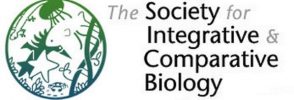Contents
Message from the Chair
Ken Halanych, Chair.DIZ@sicb.org
Dear DIZers,
Well this year has been like no other and my hope is that all are staying safe and healthy. Our normal routines, both professionally and personally, have been turned upside down. I hope that most of you have found some positive side to the situation, whether it be working from home or more regularly connecting with distant colleagues as you are a Zoom or WebEx guru now. Unfortunately, this year we will not get to see each other face to face, but the virtual venue of the SICB January meeting will offer some new opportunities and will likely change how we do some things down the road. For some, doing a virtual meeting presents a new challenge and takes a bit more effort to say engaged, but the SICB Executive Officers and Burke Associates have worked hard to make sure this coming meeting will be as smooth and as engaging as possible.
Moving forward there are several important points of business that have arisen. Firstly, I would like to introduce and congratulate Jon Allen as our next DIZ chair. Jon’s tenure will officially start at the end of this meeting. He has been a long-standing member of SICB and DIZ. I owe him a bit of thanks because Jon has kindly stepped into the roll a bit early. Due to COVID, my planned 4-week Antarctic expedition has turned into a 3-month tour of quarantine, transit and finally fieldwork. I also want to take this opportunity to thank the DIZ membership for allowing me to serve the Division for the last three years.
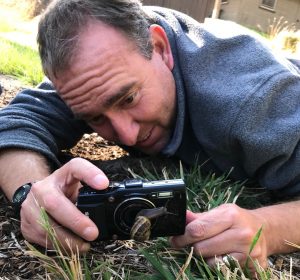
Before Jon officially takes the reins, I will be presiding over the DIZ business meeting and representing the division at the SICB business meeting. How these will work at the general meeting this year is still being worked out, but I think it is fair to say it will be a Zoom meeting. If you have a topic you wish to discuss or bring to the SICB executive committee please email Jon, Justin McAlister (DIZ secretary) or myself. I do not have the full meeting schedule at the time of writing this report, so please stay tuned for a mail about concerning information about the time and connection information of the business meeting.
Considering the meeting, there will be Best Student Presentations again this year in both oral and poster categories. Please note that the finalists for the BSP Oral contributions will also be presented in a single session on January 3rd. Please look at the meeting program for more information. As always we are looking for great symposia for future meetings. If you have a good idea, please contact DIZ Program Officer Karen Chan (kchan1@swarthmore.edu). Remember that symposia proposals that speak to multiple divisions and that balance speaker diversity are more likely to be successful.
A special thank you to Jennifer Burnaford who has served as the Chair of the Libbie Hyman scholarship committee for the past 10 years. During Jen’s time as chair, many students have received awards that have help shaped their futures! Jen will be stepping down from this position and we are in the process of finding a replacement for this important committee.
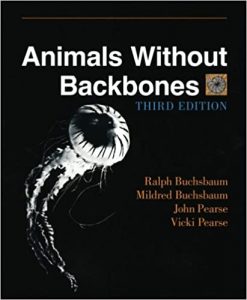
I also want to give a final shout out to a great colleague, mentor and friend to many of us. John Pearse passed away in late July. To say John was a supportive teacher of a generation of invertebrate biologist is an understatement. John always had a kind word or supportive words and always maintained an infectious joy for all things invertebrate! Donations in his memory may be made to support students in the marine sciences through UCSC’s Institute of Marine Sciences and Long Marine Laboratory, the Western Society of Naturalists, California Academy of Sciences, or Society for Integrative and Comparative Biology.
John Pearse was a wonderful teacher of invertebrates, and this year in particular teaching invertebrates and especially trying to run organismal labs has been challenging with virtual classes. A group of individuals have banded together to share ideas on teaching invertebrate biology classes. They have been covering a wide variety of both invertebrate and pedagogical topics especially in a virtual setting. Those interested in joining the discussion should reach out to Kevin Kocot (kmkocot@ua.edu) or Bruno Pernet (Bruno.Pernet@csulb.edu).
Lastly, not all understand the importance of science or trust the scientific process. With so much at stake for the future, please take time to step outside your own bubble (with a mask on, of course) and talk to others about the why science and objectivity are important. Take a little extra time to explain how we know climate change is real and exacerbated by humans, or how they might slow plastics pollution. Equally important, talk to others with a different life experience and try to see their perspective. Communication and respect are great starting points for understanding what actions might help overcome systematic bias and racism. — Ken Halanych
Message from the Program Officer
Karen Chan, DPO.DIZ@sicb.org
The first-ever virtual SICB Annual Meeting is just a few months away. While the COVID19 pandemic prevents us from physically meeting, it presents exciting opportunities for scientists from other continents to take part at SICB. We have received over 1600 abstracts from all over the world and the Program Officers are meeting on Oct 3 to finalize the program. With the extended virtual format, consider yourself has subscribed to a cool, new- science streaming platform. We will present you with a carefully curated list of talks and poster presentations. Forget Netflix and Chill, get ready for SICB and Thrill.
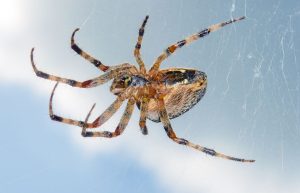
DIZ is supporting half of the upcoming symposiums which will be streamed live from Jan 4- Jan7, 2021. On Jan 4, the two DIZ-sponsored symposia are “Blinded by the light: Effects of light pollution across diverse natural systems” and “Genomic perspectives in comparative physiology of mollusk: Integration across disciplines”. On Jan 5, we will have “Biology beyond the classroom: Experimental learning through authentic research, design, and community engagement”, “An evolutionary tail: evo-devo, structure, and function of post-anal appendages”. And on Jan 6, the symposia will discuss “The integrative biology of pigment organelles”, and “The biology of sticky: adhesive silk, fiber, and glue biomaterials across Eukaryota”. There will be question and answer sessions at the end of these symposia for you to engage with the presenters.
Instead of running around in the Marriot in D.C., you can also enjoy the contributed talks and posters in the comfort of your own home/office at your own pace through Feb 28, 2021. Presenters should upload their recorded talks in December. Please stay tuned for further instructions. And don’t hesitate to reach out via email dpo.diz@sicb.org should you have any questions.
Thank you for all your support and patience during this difficult time. Don’t forget to step outside and enjoy fall in between all the Zoom meetings. I eagerly look forward to interacting with you online in Jan 2021 and see you in person in Phoenix in 2022. — Karen Chan
Message from the Secretary
Justin McAlister, secretary.diz@sicb.org
Dear Invertophiles,
This year has certainly been one for the history books; I hope this newsletter finds you doing as well as can be expected during these trying times. The other officers have provided valuable relevant updates and so I’ll keep mine short. While the format for the upcoming 2021 Annual Meeting will be different than in years past, I suspect that some new components will make for valuable
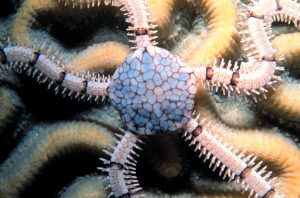
additions to future in-person meetings. I’m finding this to be true with my teaching and research as well. For example, I’m teaching marine biology online to mostly senior undergraduates this semester and I’ve incorporated an online journaling assignment. Each week the students describe in a few short sentences their thoughts about the material that was covered in class. I’ve been so impressed and amazed with the connections they’ve been making between the course material, topics they’ve learned about in other classes (even outside the sciences), and also their personal experience. It’s made for a weekly enjoyable read for me, a not too onerous assignment for my students, and has become such a valuable addition to my class that I plan to incorporate it in all future offerings. I encourage you to think about ways you might add similar components to your courses! For invertebrate biology courses, the online resources and Slack channel moderated by Kevin Kocot and Bruno Pernet that Ken alluded to in his update (above) might be a good place to start.
I also want to echo Ken’s sentiments regarding the passing of John Pearse. John and Vicki were honored at the 8th North American Echinoderm Conference in 2017 and I’ll leave you with this great picture of them and the familiar faces of a few of John’s former students. — All the best, Justin
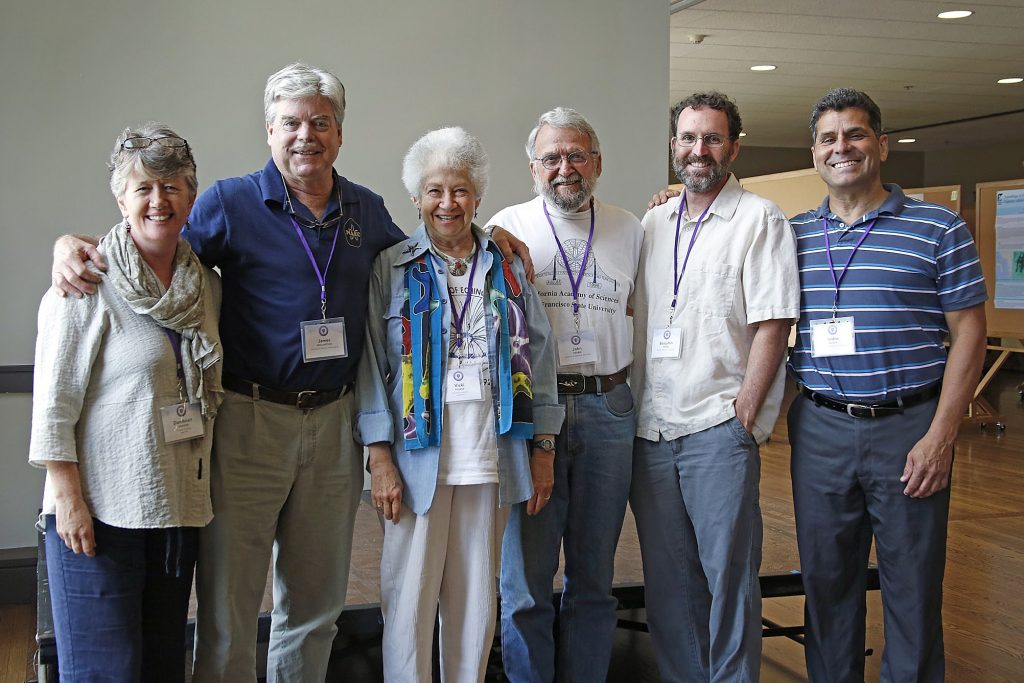
Message from the Student and Postdoctoral Affairs Committee representative
Rebecca Varney
As invertebrate zoologists, there is a tangible disconnect between our work and the frenzied advances to save human lives ongoing at every university today. Neighbors who worry that COVID was the product of an evil scientist in a secluded lair will ask me in the same breath why I would study molluscs when there are more important things to do. Friends who were forced to cull entire generations of shrimp due to university closures have had to justify their deep sadness to family members. I wondered, at the start of all this, what my little spark of science could be doing better for the vertebrate world.
A SkypeAScientist session gave me part of an answer. I signed up willing to talk one-on-one to home-schooled children and their families if needed. So, I ended up digitally in a living room in Oklahoma, being interrogated about spiny lobsters by an 8 year old. No, I don’t work on lobsters, but he had serious questions! As per usual during these sessions, if a student asks a question I don’t know the answer to, I share my screen as I seek the answer in the literature. And as I skimmed a paper trying to find out “how fast they can swim if they’re really gunning it”, his mother came to the table and somewhat shyly asked “is that what real science looks like?”. In an instant, my lobster-racing frenzy became a gentle introduction to science- the process, the statistical analyses, peer review. At the end of it, this lovely woman commented “I didn’t know you had to go through so much to publish something in science, even on lobsters?! It makes me trust the COVID drug studies a lot more.” Wow. Just wow.
Perhaps this is our power, as scientists who focus so much of our energy on the utterly bizarre lifeforms on this Earth. We are NOT
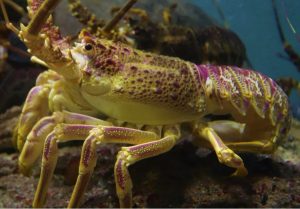
medical. We are NOT tied to a drug, or patent, or vaccine. But we ARE scientists, we do GOOD science, and we can EXPLAIN the rigorous process. It is easy to hit against defensive walls when you try to attack the issues at hand: phony drug trials, dangerous treatment suggestions, distrust in the experts. But you, right now, work on something just weird enough to be disarming. So when telling your neighbor about what you did this week, casually include that discovery alone isn’t enough, because science is held to a high standard no matter what it is. Talk about how that standard makes things take longer but allows us to trust in other scientists more. Who knows- your weird system or question might help another person think of the scientific community as a little more trustworthy. And if not, you still got some scicomm practice!
If you’re wondering, lobsters can hit 5 m/s (11 mph), but only when they’re startled.
Stay well and be kind to one another and yourself! — Rebecca Varney
Message from the Student Awards Committee Chair
Anne Böttger
Another meeting is almost upon us, and we would like to encourage all post-graduate members who are registered for the SICB Virtual Meeting in January 2021 to sign up as judges. Registrants will have the option to sign up as a judge in the checkout section of their online registration. In addition, you are also welcome to sign up as a judge by contacting me directly at aboettger@wcupa.edu.
Please help us continue the DIZ’s established history of valuing student presentations by signing up as a judge to evaluate student presentations and provide students with valuable comments that will aid them with future presentations. There are currently 11 poster presentations that need to be evaluated by 3-4 judges each. In addition, an ad-hoc committee chose 10 oral student presentations to be evaluated for BSP.
Judges will be able to choose presentations they are willing to evaluate via the online program for the virtual SICB meeting, which will hopefully be available in November. At that time judges should go online and select the DIZ presentations they want to judge: first come, first serve. When the schedule is complete, I will email your assignments and judging forms – typically in late December.
If you have not volunteered as a judge, I strongly encourage you to consider volunteering. It is great fun and a wonderful way to help the division. Judges are often in short supply and yet necessary to continue to offer student awards. In addition, judges’ comments are meaningful and important to prepare students for future presentations and help shape their future research questions. If you have any questions regarding the duties of a judge in this virtual format, please do not hesitate to email me at aboettger@wcupa.edu. You may also find additional information under FAQ’s for the virtual SICB meeting at https://sicb.burkclients.com/meetings/abstractfaq.php3.
I would like to thank all past DIZ judges for their time and effort and ask for their continued help. — Anne Böttger
Message from the Libbie Hyman Scholarship Selection Committee Chair
Jennifer Burnaford
In 2020, three scholars were awarded Libbie Hyman Memorial Scholarship funds to support their first significant field station experiences. We awarded $3000 to Charlotte Benedict, a graduate student at Ohio State University, to support participation in the
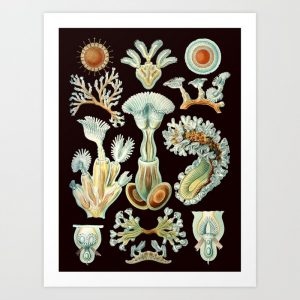
Marine Invertebrate Zoology course at the University of Washington Friday Harbor Laboratories. We awarded $1000 to Hannah Lee, a graduate student at Humboldt State University, to support travel to the Oregon Institute of Marine Biology as part of her MS work on the evolution of cheilostome bryozoans. We awarded $654 to Rachel Surprenant, a graduate student at the University of California Riverside, to support her participation in the ‘Taphonomic and Ecological Processes in Tropical Environments’ course at the University of the Bahamas Gerace Research Centre on San Salvador.
Unfortunately, the COVID-19 pandemic prevented all of our award recipients from pursuing their planned activities, as field stations around the world cancelled courses or closed their doors in an effort to flatten the curve. Because the parameters of the Libbie Hyman award are very specific (the award provides funding to support the first significant field station experience for students pursuing coursework or research on invertebrates), the funds cannot be used for alternative experiences. Therefore we have simply postponed the awards for the 2020 scholarship recipients so that they will be able to use the funds to pursue their proposed activities in 2021. Alternatively, if they wish to apply for support for a different activity for summer 2021, their new applications will be considered.
In hopes that field stations around the world will be able to resume activities, we will accept applications for the 2021 field season, with a closing date of February 4, 2021. The application form is available at http://sicb.org/grants/hyman/. If you or your students have questions about the application process, please feel free to contact me via email (my address is available at that site). Please encourage your best students to apply!
I wish to thank Will Jaeckle and Shanna Hanes for their service on the committee this year, and Ruedi Birenheide for making the web-based application process work smoothly. The Libbie Hyman Scholarship Committee extends our best wishes to all SICB members and their loved ones in this unprecedented and challenging time. — Jennifer Burnaford
